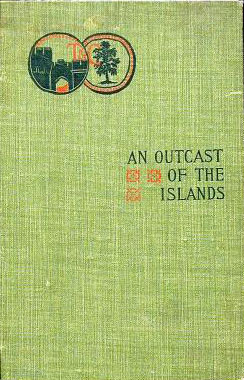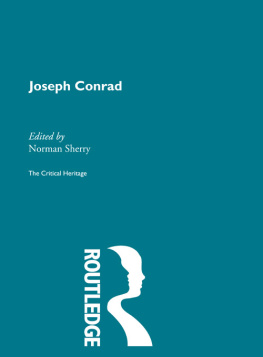Joseph Conrad - Within the Tides: Tales
Here you can read online Joseph Conrad - Within the Tides: Tales full text of the book (entire story) in english for free. Download pdf and epub, get meaning, cover and reviews about this ebook. year: 1997, genre: History. Description of the work, (preface) as well as reviews are available. Best literature library LitArk.com created for fans of good reading and offers a wide selection of genres:
Romance novel
Science fiction
Adventure
Detective
Science
History
Home and family
Prose
Art
Politics
Computer
Non-fiction
Religion
Business
Children
Humor
Choose a favorite category and find really read worthwhile books. Enjoy immersion in the world of imagination, feel the emotions of the characters or learn something new for yourself, make an fascinating discovery.

- Book:Within the Tides: Tales
- Author:
- Genre:
- Year:1997
- Rating:3 / 5
- Favourites:Add to favourites
- Your mark:
- 60
- 1
- 2
- 3
- 4
- 5
Within the Tides: Tales: summary, description and annotation
We offer to read an annotation, description, summary or preface (depends on what the author of the book "Within the Tides: Tales" wrote himself). If you haven't found the necessary information about the book — write in the comments, we will try to find it.
Within the Tides: Tales — read online for free the complete book (whole text) full work
Below is the text of the book, divided by pages. System saving the place of the last page read, allows you to conveniently read the book "Within the Tides: Tales" online for free, without having to search again every time where you left off. Put a bookmark, and you can go to the page where you finished reading at any time.
Font size:
Interval:
Bookmark:
WITHIN THE TIDES
TALES
. . . Go, make you ready.
Hamlet to the Players.

THE PLANTER OF MALATA
CHAPTER I
In the private editorial office of the principal newspaper in a great colonial city two men were talking. They were both young. The stouter of the two, fair, and with more of an urban look about him, was the editor and part-owner of the important newspaper.
The others name was Renouard. That he was exercised in his mind about something was evident on his fine bronzed face. He was a lean, lounging, active man. The journalist continued the conversation.
And so you were dining yesterday at old Dunsters.
He used the word old not in the endearing sense in which it is sometimes applied to intimates, but as a matter of sober fact. The Dunster in question was old. He had been an eminent colonial statesman, but had now retired from active politics after a tour in Europe and a lengthy stay in England, during which he had had a very good press indeed. The colony was proud of him.
Yes. I dined there, said Renouard. Young Dunster asked me just as I was going out of his office. It seemed to be like a sudden thought. And yet I cant help suspecting some purpose behind it. He was very pressing. He swore that his uncle would be very pleased to see me. Said his uncle had mentioned lately that the granting to me of the Malata concession was the last act of his official life.
Very touching. The old boy sentimentalises over the past now and then.
I really dont know why I accepted, continued the other. Sentiment does not move me very easily. Old Dunster was civil to me of course, but he did not even inquire how I was getting on with my silk plants. Forgot there was such a thing probably. I must say there were more people there than I expected to meet. Quite a big party.
I was asked, remarked the newspaper man. Only I couldnt go. But when did you arrive from Malata?
I arrived yesterday at daylight. I am anchored out there in the bayoff Garden Point. I was in Dunsters office before he had finished reading his letters. Have you ever seen young Dunster reading his letters? I had a glimpse of him through the open door. He holds the paper in both hands, hunches his shoulders up to his ugly ears, and brings his long nose and his thick lips on to it like a sucking apparatus. A commercial monster.
Here we dont consider him a monster, said the newspaper man looking at his visitor thoughtfully.
Probably not. You are used to see his face and to see other faces. I dont know how it is that, when I come to town, the appearance of the people in the street strike me with such force. They seem so awfully expressive.
And not charming.
Wellno. Not as a rule. The effect is forcible without being clear. . . . I know that you think its because of my solitary manner of life away there.
Yes. I do think so. It is demoralising. You dont see any one for months at a stretch. Youre leading an unhealthy life.
The other hardly smiled and murmured the admission that true enough it was a good eleven months since he had been in town last.
You see, insisted the other. Solitude works like a sort of poison. And then you perceive suggestions in facesmysterious and forcible, that no sound man would be bothered with. Of course you do.
Geoffrey Renouard did not tell his journalist friend that the suggestions of his own face, the face of a friend, bothered him as much as the others. He detected a degrading quality in the touches of age which every day adds to a human countenance. They moved and disturbed him, like the signs of a horrible inward travail which was frightfully apparent to the fresh eye he had brought from his isolation in Malata, where he had settled after five strenuous years of adventure and exploration.
Its a fact, he said, that when I am at home in Malata I see no one consciously. I take the plantation boys for granted.
Well, and we here take the people in the streets for granted. And thats sanity.
The visitor said nothing to this for fear of engaging a discussion. What he had come to seek in the editorial office was not controversy, but information. Yet somehow he hesitated to approach the subject. Solitary life makes a man reticent in respect of anything in the nature of gossip, which those to whom chatting about their kind is an everyday exercise regard as the commonest use of speech.
You very busy? he asked.
The Editor making red marks on a long slip of printed paper threw the pencil down.
No. I am done. Social paragraphs. This office is the place where everything is known about everybodyincluding even a great deal of nobodies. Queer fellows drift in and out of this room. Waifs and strays from home, from up-country, from the Pacific. And, by the way, last time you were here you picked up one of that sort for your assistantdidnt you?
I engaged an assistant only to stop your preaching about the evils of solitude, said Renouard hastily; and the pressman laughed at the half-resentful tone. His laugh was not very loud, but his plump person shook all over. He was aware that his younger friends deference to his advice was based only on an imperfect belief in his wisdomor his sagacity. But it was he who had first helped Renouard in his plans of exploration: the five-years programme of scientific adventure, of work, of danger and endurance, carried out with such distinction and rewarded modestly with the lease of Malata island by the frugal colonial government. And this reward, too, had been due to the journalists advocacy with word and penfor he was an influential man in the community. Doubting very much if Renouard really liked him, he was himself without great sympathy for a certain side of that man which he could not quite make out. He only felt it obscurely to be his real personalitythe trueand, perhaps, the absurd. As, for instance, in that case of the assistant. Renouard had given way to the arguments of his friend and backerthe argument against the unwholesome effect of solitude, the argument for the safety of companionship even if quarrelsome. Very well. In this docility he was sensible and even likeable. But what did he do next? Instead of taking counsel as to the choice with his old backer and friend, and a man, besides, knowing everybody employed and unemployed on the pavements of the town, this extraordinary Renouard suddenly and almost surreptitiously picked up a fellowGod knows whoand sailed away with him back to Malata in a hurry; a proceeding obviously rash and at the same time not quite straight. That was the sort of thing. The secretly unforgiving journalist laughed a little longer and then ceased to shake all over.
Oh, yes. About that assistant of yours. . . .
What about him, said Renouard, after waiting a while, with a shadow of uneasiness on his face.
Have you nothing to tell me of him?
Nothing except. . . . Incipient grimness vanished out of Renouards aspect and his voice, while he hesitated as if reflecting seriously before he changed his mind. No. Nothing whatever.
You havent brought him along with you by chancefor a change.
The Planter of Malata stared, then shook his head, and finally murmured carelessly: I think hes very well where he is. But I wish you could tell me why young Dunster insisted so much on my dining with his uncle last night. Everybody knows I am not a society man.
The Editor exclaimed at so much modesty. Didnt his friend know that he was their one and only explorerthat he was the man experimenting with the silk plant. . . .
Still, that doesnt tell me why I was invited yesterday. For young Dunster never thought of this civility before. . . .
Font size:
Interval:
Bookmark:
Similar books «Within the Tides: Tales»
Look at similar books to Within the Tides: Tales. We have selected literature similar in name and meaning in the hope of providing readers with more options to find new, interesting, not yet read works.
Discussion, reviews of the book Within the Tides: Tales and just readers' own opinions. Leave your comments, write what you think about the work, its meaning or the main characters. Specify what exactly you liked and what you didn't like, and why you think so.












